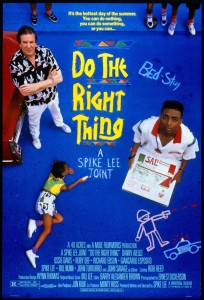
We’re All Racist
 One of the most provocative films I ever saw was Do the Right Thing. I saw it on opening weekend in a packed theatre with an urban mixed-race audience. Skeptics had been predicting that the movie would incite riots. But a remarkable thing happened. The audience saw Mookie’s point of view, and they saw Sal’s, too.
One of the most provocative films I ever saw was Do the Right Thing. I saw it on opening weekend in a packed theatre with an urban mixed-race audience. Skeptics had been predicting that the movie would incite riots. But a remarkable thing happened. The audience saw Mookie’s point of view, and they saw Sal’s, too.
For the most part, Lee has continued to make responsible films over the years… and we should be listening, whether we are or not. And given recent events in Los Angeles (are you listening, Donald Sterling?), I’d say we’re mostly not.
However—one of the most ridiculous statements I ever heard was Spike Lee’s assertion that “Black folks can’t be racist. White folks invented that shit!” In fact, I thought the statement so ridiculous that I concluded either Lee was insane, or I didn’t understand the English language. So I started paying more attention to what Lee was saying.
I discovered that, by his definition, “racism” is not the same thing as “prejudice” or “bigotry.” Racism is institutionalized bigotry, according to Lee. A less provocative translation of Lee’s statement would be, “Minorities can’t be racist; they don’t have the power to legally oppress others. Minorities can certainly be bigoted, but only the majority race can systematically and legally deny the rights of others.”
So for a long time I’ve been sympathetic to Lee’s point. But something about his view has never really set right with me… and I’ve finally figured out what it is. At the risk of coming off as a racist (since I certainly am part of that white male majority), let me try to explain.
The political issue at the core of the American Civil War was “States’ Rights.” One side of the argument claimed that the Federal Government had the right to trump local jurisdictions and, just for one example, abolish slavery at the national level. The other side of the argument claimed that it was up to the states to decide such issues. So for the first eight decades, our nation had “slave” states and “free” states, and our federal government spent a great deal of time haggling over whether new states would be admitted to the union as “slave” or “free.” Oh. And then there was that war.
So how do we see states’ rights being worked out today? Not so long ago (okay, maybe forty years is a while back) the Federal government decided that vehicle speeds should be limited to 55 mph in order to conserve energy. So local jurisdictions lost the right to set freeway speed limits, and those roads we used to drive at 70 just didn’t seem that exciting any more, and Sammy Hagar had a hit record. (Am I dating myself?) After the energy scare passed (and Hagar joined Van Halen), the states got the right to regulate speed limits again. In sections of Montana today, there are no posted limits, which makes Sammy really happy.
My point? Just this: it’s never really mattered whether the Federal or state government has set the speed limit. Drivers have ignored the law in every single case. In America, you see, personal rights have always trumped Federal rights and states’ rights. So institutionalized racism is toothless if the citizenry has the brains and the balls to say, “Screw you. I know the right thing when I see it.”
So I don’t think I agree with Lee any more. His definition of racism cedes the Federal government way more power than it actually has. That view allows the spineless bigot to say, “I was only following orders.” It allows the oppressed to say, “I’m a victim.” Bull.
So here’s the gold in the gutter: how I treat another human being matters. Period. Race don’t enter into it, unless I—I, personally—let it, Donald.
Copyright © Cary Blankenship